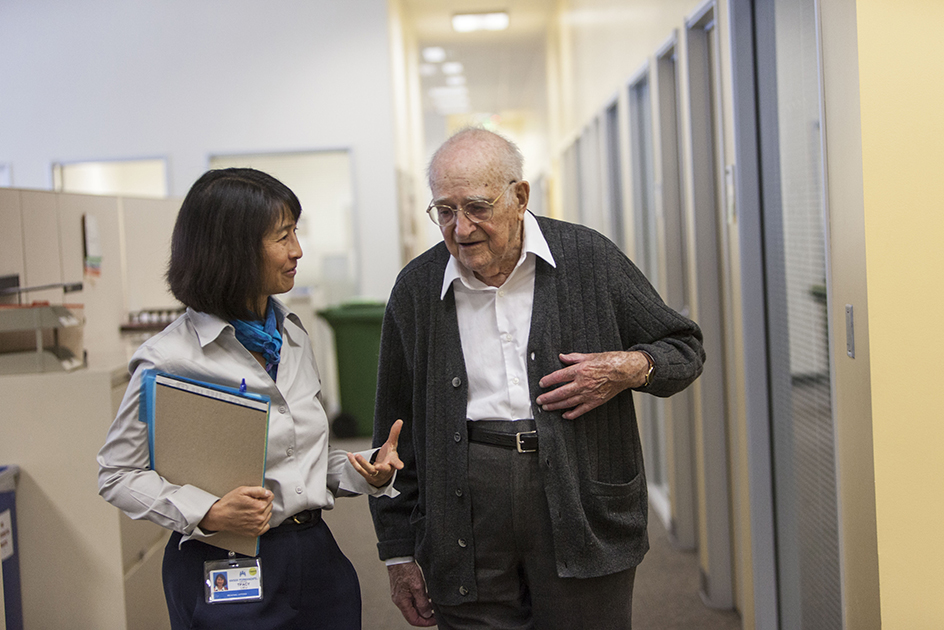Kaiser Permanente's report in NEJM AI details insights from a large-scale rollout of ambient AI clinical documentation technology.
Health Care Research: A Moral Responsibility?
How and Why Kaiser Permanente Researchers Apply Their Best Efforts to Transforming How Health Care is Provided

By Janet Byron
Research has been part of Kaiser Permanente’s DNA since the 1940s, when internist Morris F. Collen, MD, a founder of The Permanente Medical Group, conducted studies on the effectiveness of the “wonder drug” penicillin to treat pneumonia in shipyard workers.
Later, as director of Kaiser Permanente’s first research division, Dr. Collen developed an early prototype of the electronic medical record using data from a health screening-exam that he had devised. Data was collected through the early 1980s and is still being utilized by Kaiser Permanente researchers today.
Kaiser Permanente has continued to make substantial investments in health care delivery research. Why don’t more health care systems take such initiative?
In a recent perspective in the New England Journal of Medicine, Tracy A. Lieu, MD, MPH, director of the Kaiser Permanente Northern California Division of Research, and co-author Richard Platt, MD, of Harvard Pilgrim Health Care Institute, argue that health care systems have a moral responsibility to take the lead in conducting research that transforms the way medicine is practiced in the United States and beyond.
You make the case that health care research is overdue for a transformation. Why?
In some areas of medicine, we don’t have the evidence that we need to know what the best actions are. Or, we know what those actions are but we don’t know how to effectively deliver care to people in real-life situations.
What’s an example of how research can transform health care?
The best medical research starts with clinical questions and moves into patient care. Take screening for colorectal cancer. At Kaiser Permanente, we’ve studied every aspect of that process — sigmoidoscopy, colonscopy, fecal immunochemical tests — and once we found what worked, we figured out how to get patients to do the screening. As a result, we have among the highest screening rates in the world for colorectal cancer. Now we are evaluating how our specialist physicians are doing this work, and how we can make our colorectal cancer screening process even better.
Explain how Kaiser Permanente has had researchers embedded in the health care system since its earliest years.
Kaiser Permanente’s tradition of utilizing research to improve health care dates back to our founder, Sidney Garfield, MD, and his first research director, Dr. Morrie Collen. Dr. Garfield said that smart health care systems need to have a research group, and by the way, we need to use computers to do this work. It was about investing the organization’s energy not only in clinical care, but also into researching the best methods for providing that care.
How does the medical group support research into clinical questions today?
The Division of Research plays a key role for Kaiser Permanente physicians through collaborations with our research scientists. We help dozens of clinicians to design their studies properly and analyze data. In recent years, our Rapid Analytics Unit has provided efficient support for short-term projects to address specific clinical needs. A new initiative called the Physician Researcher Program will provide time and funding for clinicians seeking to address questions in their specialties, as well as institutional support to do this work in ways that will have the greatest impact.
You’re making a plea for health care systems to spend research dollars in the ways that are most likely to improve health care.
We’re asking for a shift in the locus of responsibility for this type of research. We think that the rest of the country can learn from Kaiser Permanente’s experience with transformative health care research. We publish hundreds of research papers every year. When we discover something that could be helpful to others, we demonstrate our leadership by sharing it.
Read the New England Journal of Medicine article.
Janet Byron is a senior communications consultant with Kaiser Permanente Division of Research in Oakland, Calif. Photo above courtesy of the Division of Research.


